
Short but powerfully unsettling, Threshold takes aim at the strange and horrifying helplessness of being a small cog in a giant corporate machine, and nails its execution brilliantly.
Threshold is the kind of horror game that keeps just enough at arm’s length to really set your mind ablaze while you’re playing. After landing a coveted job with the government, the game begins as you prepare to take on your first shift looking after an important maintenance post just outside the city walls. But before you even arrive, it’s clear that something’s a bit off. A low, angry and muffled voice directs you into a lift. There’s an oxygen meter to your left, and as you start the long ascent up to the surface you watch your supply dwindle away to almost nothing. The air is thin up here, so much so that the clerk you’re relieving, a no-nonsense chap called Mo, speaks to you via hastily written notes, as talking simply involves too much effort.
Before you can wonder ‘what the heck have I walked into?’, Mo hands you a whistle and brings you to a large horn at the centre of your work area. Blowing the whistle here makes sure the large, ominous train trundling along on the other side of the river keeps moving at the ‘expected pace’, and you’ll need to rush back here every time it starts to slow down to make sure it keeps up to speed. For what purpose, you’re not told. Only that this is what the capital dictates. Trouble is, with the air being so scarce up here, blowing that whistle is surprisingly taxing, so you’ll need to clamp your teeth down on tiny little Air Cans to get your breath back every time you start wheezing or black, pixely veins start clouding your vision. And the more Air Cans you consume, the more bloodied the little picture of your mouth starts to become in the top left corner of the screen.
But this strange and unnerving setup is just the tip of the iceberg. As you settle into a gentle rhythm of keeping the train going and fetching tickets from a special machine to swap for more air cans, questions about the reality of this place start building up – both for your clerk and you as a player. Why is the toilet locked? And why does the river drain when the train slows down? Who was Ni, the clerk you’ve replaced? And why does Mo hate them so much?
Your clerk will log some of these questions in their own mind, but finding answers to them are harder to come by. Threshold does a brilliant job of letting these thoughts sit with you for a while, seeding its ideas upfront and without context so they swill around in your head, before eventually proffering up answers of its own – though whether you believe them is another matter entirely. The sparse and potentially unreliable script repeatedly butts heads with the clear evidence in front of you – though the shifting textures of the game’s PS1-era visuals certainly contribute to everything feeling just a little bit otherworldly at the same time. Still, even when answers do come, they’ll sometimes just beget even more questions in the process, and Threshold’s greatest strength is how it gives you the space to form your own conclusions about what’s really going on here.
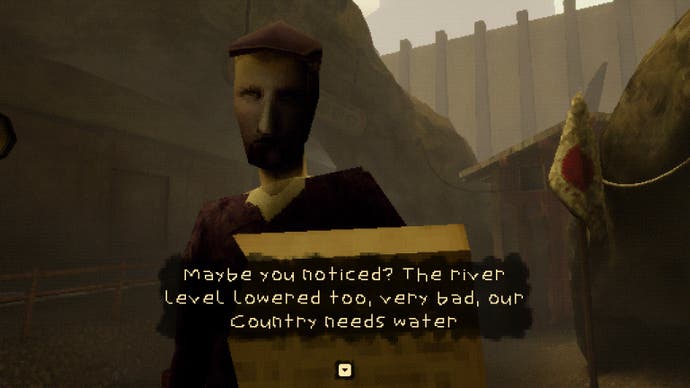
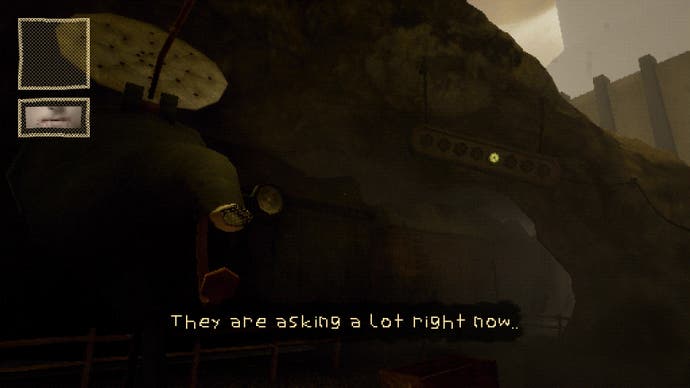
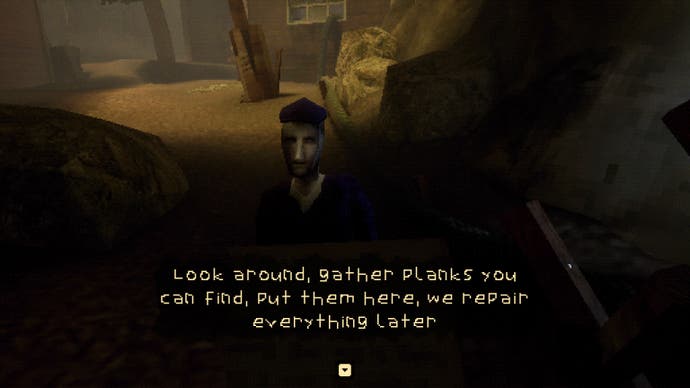
All the while, of course, you’ll still need to keep that train running. As the cycle of corporate plate spinning begins anew, other tasks from Mo start creeping in to split your attention, such as collecting stray planks of wood or keeping the end of the river clear of ‘unwanted biomass’. But all of them are designed to needle away at that one fundamental mystery, introducing ever stranger elements to fire up your imagination. The more you engage in the job, the more inane it starts to appear, and it becomes a highly effective tool to fuel your desire to find out the truth of this place once and for all.
On a moment-to-moment basis, the gradual pile-up of tasks is also just a satisfying exercise in its own right. The water filter where the biomass collects is quite a walk away from the horn and the machine that dispenses your air can ticket, for example, and wading through the water is even more of a strain on your already fragile lungs. The time and oxygen it requires all needs to be weighed up against the pace of that infernal train, and every time I contemplated going down there, I found myself straining my ears for that tell-tale screech of the train’s brakes that always precedes when it’s about to slow down. You’ll wonder whether there’s something better you could be doing with your time, another task you could complete along the way, or when would be best to bite down on yet another air can so you can make the most of your remaining breaths. Even as you question your role here, it’s hard to resist becoming the perfect picture of industrial efficiency.
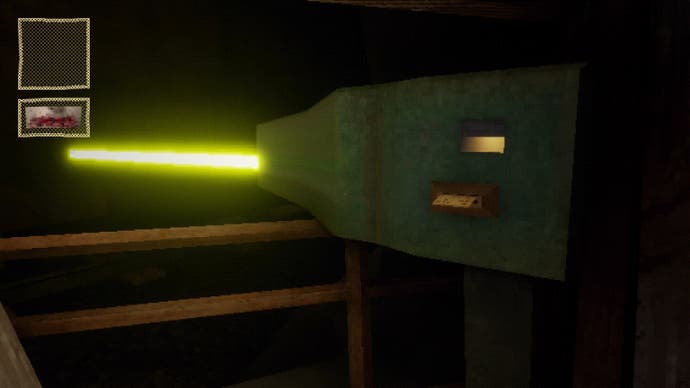
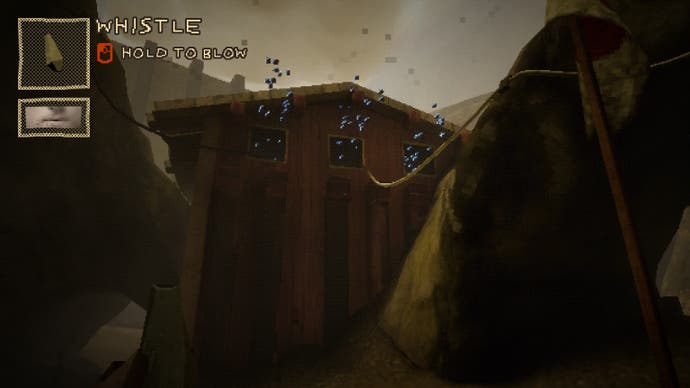
Indeed, there’s never so much on your plate that you can’t keep things ticking along quite nicely, despite the ever-present threats to your overall wellbeing. If the train starts lagging behind, for example, your air can dispenser stops working, and it won’t start back up again until the expected pace has been met again. You’ll therefore need to keep a healthy supply of air cans and tickets with you at all times, just to make sure you’re not caught short. But as long as the train keeps running, the ticket machine will keep punching out cards for you – which it does so with a very pleasing chnk-chnk-chnk that only gets faster as the train’s expected pace increases. It would be hard to do a bad job or completely run out of air, in that sense, but the ease with which you’re able to course-correct doesn’t make the busy-work any less compelling in the moment.
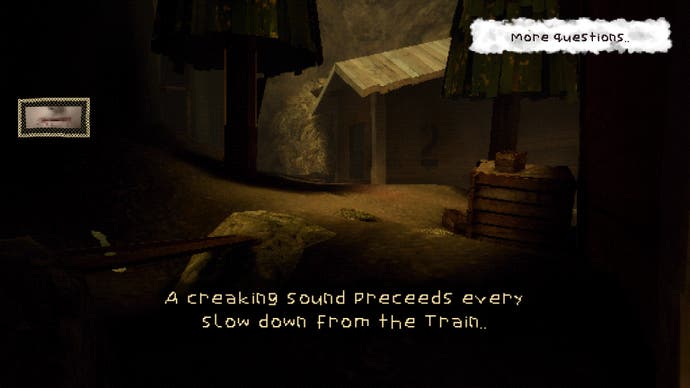
That’s partly because Threshold is never quite content to let that general status quo last for very long. Rather, it’s the gradual and expertly paced disruptions to your working rhythm that make the game feel so thrilling and alive, like there’s some kind of unknowable force wriggling beneath the surface just out of sight. As the earth begins to shake, the river starts to swell and the mountain shifts ever more violently beneath your feet, the fabric of the world itself reflects that growing pressure cooker you’ve got bubbling up in your own mind, everything building and building until the centre can no longer hold and it all erupts in one of the most spectacular endings I think I’ve seen all year.
And yet, even after all that, Threshold still isn’t quite ready to relinquish its grip on you, as a closing teaser reveals yet another layer of the game’s underlying truth. It’s just enough to pull you back in for another shift, and to keep seeking answers to its impossible questions. There’s a sense you’ll never quite get your arms around the full extent of the role your clerk’s been given, but it’s the act of reaching for it that makes Threshold so deeply and utterly mesmerising.
A copy of Threshold was provided for review by publisher Critical Reflex.
